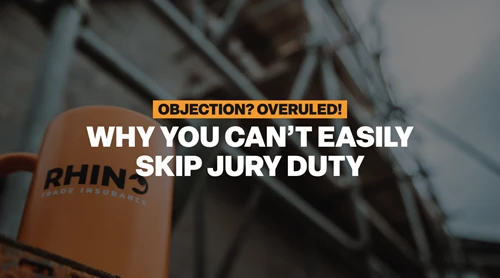If you’ve recently started to work as a subcontractor, you might not know what insurance you need. Which policies are important, and which are more like added extras? And, if you’re working for contractors who have their own insurance, do you even need any insurance at all?
It doesn’t pay to wonder in the insurance game. Rhino are here to iron out all the gritty details around public liability for subcontractors so you know what’s what.
Understanding Public Liability Insurance for Subcontractors
Just about anyone who is self-employed needs Public Liability Insurance. But what is it?
Public Liability Insurance is a policy which offers much-needed protection from legal claims made against your business. These claims can come following harm you have accidentally caused to a third party or their property in the course of your work. Third parties could include a customer, supplier, or member of the public.
It’s especially important for tradespeople to be covered with Public Liability Insurance, as they face elevated risks in their work.
Do Subcontractors Need Their Own Public Liability Insurance?
The short answer is yes. Let’s take a look at why.
How Public Liability Insurance Specifically Relates to Subcontractors
As a subcontractor, you have a particular skill or specialty which is in high demand. You carry out work for contractors, assisting them with larger projects.
For example, you may be a plumbing subcontractor hired to carry out work on a larger building project. You may not be responsible for the entire project, but you’re responsible for the plumbing element (either alone, or working alongside other subcontractors).
The main contractor will have their own Public Liability Insurance. This will cover many situations, including accidents which happen to third parties on the site. However, unless subcontractors are specifically named as ‘insured parties’ in the main contractor’s Public Liability Insurance policy, subcontractors will still need their own Public Liability Insurance to cover things that they are directly the cause of.
What Counts as a Subcontractor?
There is an important distinction when it comes to who needs their own subcontractors Public Liability Insurance. Anyone who is considered a direct employee of the main contractor is covered under the main contractor’s Public Liability Insurance. A direct employee would be someone on the payroll, who uses the tools and equipment of the main contractor.
Subcontractors cannot be direct employees, although in some cases subcontractor can be disguised as independent workers when they’re actually employees. A good way to spot a true (or ‘bona-fide’) subcontractor is to consider whether they consider themselves self-employed, pay their own tax and National Insurance, they have their own tools, and are hired for a specific period of time (e.g., a contract).
It’s important to note that ‘third parties’ doesn’t cover direct employees. Employees are covered by a separate policy – Employer’s Liability Insurance. Some people call this ‘worker’s compensation insurance’. You only need this if you employ anyone directly in your business (including as an apprentice).
Common Risks Faced by Subcontractors in Their Line of Work
Risks to subcontractors are many and varied. Some will be specific to the trade. Getting stuck up a chimney, for instance. Not something for pebble-dashers to worry much about, but a daily concern for chimney sweeps. Other risks are general and will apply to most tradespeople (such as causing third-party trips and falls).
A huge number of Public Liability claims stem from people injuring themselves on equipment or other aspects of the job area. Tradespeople usually work either in customer’s homes or on chaotic job sites near busy streets or workplaces, making the likelihood of accidents high.
Further, working at height, working with power tools, heavy machinery, harmful chemicals and substances, dust, fumes and around unpredictable old structures can all pose serious daily risks to a subcontractor working in the UK.
Examples of When Public Liability Insurance Would Protect Subcontractors
Here are a couple of examples when Public Liability Insurance would come through for subcontractors:
- A plumber leaves a pipe unsealed during the building of a new house, leading to a wet floor. A visitor to the site slips in the water and breaks their leg. It was the plumber’s responsibility to finish the pipe, so they get sued by the injured party. The plumber’s Public Liability Insurance pays out.
- A painter & decorator accidentally spills paint on an office carpet while they’re working on renovations as part of a wider team. It was the P&D’s fault – so they claim it on their personal Public Liability Insurance policy. The contractor doesn’t need to get involved, and the subcontractor doesn’t have to pay out of pocket.
- A subcontracted bricklayer is working on a building site when they are electrocuted by an ungrounded wire. An electrician, also a subcontractor, was to blame. The electrician’s Public Liability Insurance paid for the costs of the bricklayer’s recovery, missed income, legal fees and compensation.
What Happens if a Subcontractor Doesn’t Have Public Liability Insurance?
- They take the financial hit if something happens
There are some serious implications of going without adequate Public Liability Insurance coverage as a subcontractor. The most impactful will be that if you are the cause of an accident on the job site, or inadvertently damage someone’s property, then you’ll be fully liable to pay the costs associated. These costs could be anywhere from a few thousand to a million quid – or even more.
This is the number one reason why almost all subcontractors in the UK have Public Liability Insurance. Knowing that accidents happen every single day on job sites across the UK is enough to deter people from taking that chance.
- They may not get hired in the first place
The second key impact of a subcontractor not having Public Liability Insurance cover is that they wouldn’t get much work without coverage. Even if your prices are lower, no contractor is going to take a chance on an uninsured subcontractor, as should anything happen then the contractor would risk getting sued instead. It’s simply not worth the risk, which is why you’ll find showing your insurance certificates a condition of most contracts. Some contracts even specify the level of cover you should have, from £1million even up to £10million, so make sure you check the small print on contracts.
How to Get Public Liability Coverage for Subcontractors
The first step is talk to Rhino. We are the trade insurance experts, so we know the type of risks you face in your subcontracting work and can advise on how to tailor your policy accordingly.
Some trades are naturally more dangerous and face a higher level of risk as a result. You can adjust your indemnity limit to suit the level of risk you face. Ultimately, your coverage limit will be your choice – but remember that a certain level of cover often comes as a condition of work contracts.
Try Rhino’s quick quote generator today, or simply give our knowledgeable team a call on 0116 243 7904 and let us guide you to the perfect Public Liability policy to suit your subcontracting business.




